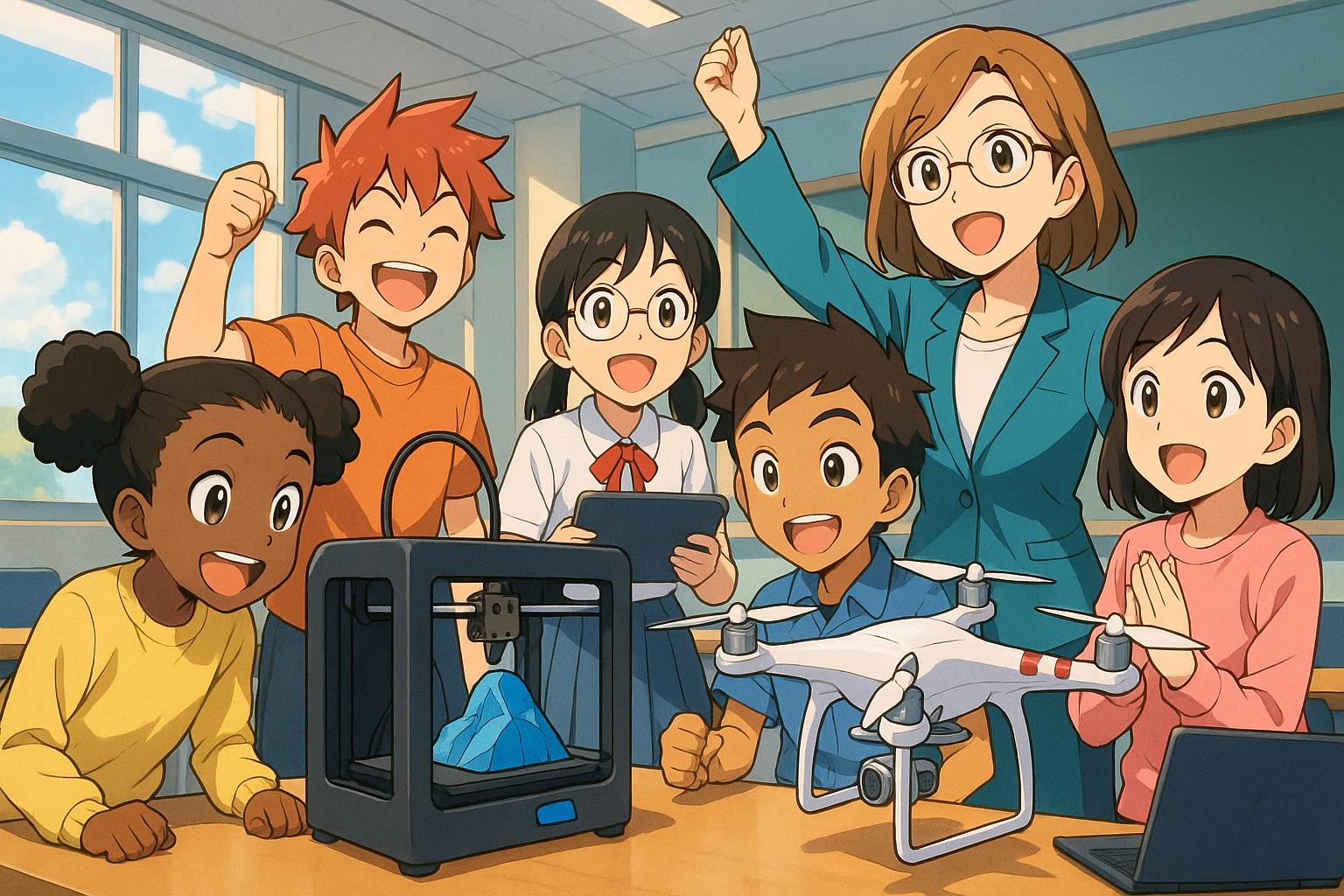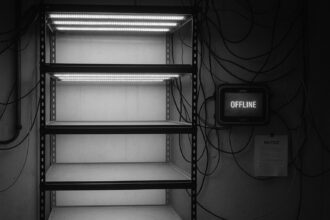Ed Farm’s transformative initiatives in Birmingham are reshaping learning through technology, empowering educators and students to lead in a digital future at the recent Future of Learning Summit.
From students to educators, the transformative impact of Ed Farm, a tech-focused nonprofit based in Birmingham, was unmistakable at the recent Future of Learning Summit (FOLS). This annual event serves as a platform to gather a community of educators to reimagine learning through technology and innovative curricula. With its mission to cultivate a digitally fluent workforce, Ed Farm continues to engage and empower participants from various backgrounds.
The summit kicked off with a panel featuring key municipal leaders, including Birmingham Mayor Randall Woodfin, Montgomery Mayor Steven Reed, and Warner Robins (Georgia) Mayor LaRhonda Patrick. The discussions underscored a shared commitment to enhancing educational outcomes through technology integration. Teachers like Tambra Clark, a media specialist at South Hampton K-8 School, expressed how Ed Farm reshaped her professional trajectory. “Ed Farm has changed my life,” Clark stated, praising the extensive support provided to educators aiming to incorporate technology in their teaching practices. Her library has evolved from basic resources to a cutting-edge innovation hub, featuring tools such as 3D printers, drones, and podcasting equipment that allow students to express their creativity and engage in meaningful projects.
For students like Khari Pope, an 8th grader at Huffman Middle School, Ed Farm has been pivotal in fostering leadership skills. “Ed Farm has changed everything by inspiring me to be more creative,” she remarked. Pope’s experience illustrates the broader ethos of the programme, which emphasises that student agency is crucial: “It can’t always be the teachers. We have to step up as students.” This sentiment resonates with many participants who are eager to explore technology-infused education further.
Launched in 2020 with support from partners like Apple and Alabama Power, Ed Farm directly addresses the disparity in digital skills within education. The organisation’s initiatives, including the South Hampton Innovation Library, highlight the creation of learning environments that facilitate exploration and innovation. Clark’s library is a testament to this commitment, enabling her students to compete nationally, previously an aspiration hindered by outdated resources.
Further extending this philosophy, Candyce Monroe, Head of Learning Programs at Ed Farm, emphasised the importance of equipping students with relevant skills. “I’ve always believed that students should have tools, skills, and strategies that enable them to feel and create the jobs of the future,” she said. Monroe’s journey from classroom teacher to leader within Ed Farm reflects a dedicated progression towards integrating technology in real-world contexts.
A particularly unique aspect of the summit was the “Student Takeovers,” where students showcased solutions grounded in community issues. For instance, students from various schools presented a rap aimed at motivating peers for upcoming state tests, while others unveiled an app designed to combat rising teen suicide rates. For 7th grader Saniyah Horn, these initiatives underscored the value of collaboration and innovation. “Tech is a blessing and a curse,” she noted, advocating for its responsible use as a catalyst for positive change.
The enthusiasm observed among the students, especially when they shared the outcomes of their projects, reinforced the summit’s objectives of fostering creativity and problem-solving skills. Although Horn’s team secured third place in a recent competition, she highlighted the joy of teamwork over rankings, embodying the spirit of resilience and collaboration that Ed Farm nurtures.
As the digital landscape continues to evolve, Ed Farm stands as a beacon of hope and innovation, dedicated to shaping a future where every learner is prepared to thrive in a tech-driven world.
 Reference Map:
Reference Map:
- Paragraph 1 – [1], [3]
- Paragraph 2 – [1], [6]
- Paragraph 3 – [2], [5]
- Paragraph 4 – [4], [7]
- Paragraph 5 – [3], [6]
- Paragraph 6 – [1], [2]
Source: Noah Wire Services
- https://www.birminghamtimes.com/2025/06/leaders-educators-and-students-focus-on-techs-future-at-ed-farms-learning-summit/ – Please view link – unable to able to access data
- https://www.edfarm.org/ – Ed Farm is a nonprofit organisation based in Birmingham, Alabama, dedicated to preparing students, educators, and adult learners for a tech-driven world. Founded in partnership with Apple and the Alabama Power Foundation in 2020, Ed Farm offers programmes that engage learners in innovative digital skills experiences, aiming to close the digital skills gap and better prepare individuals for the 21st-century workforce. Their initiatives include student programmes, educator professional development, workforce programmes, and the creation of learning spaces equipped with industry-leading technology.
- https://www.birminghamtimes.com/2025/06/leaders-educators-and-students-focus-on-techs-future-at-ed-farms-learning-summit/ – The article discusses the Future of Learning Summit (FOLS) hosted by Ed Farm in Birmingham, Alabama. The summit brought together educators, students, and community leaders to explore the future of education through technology. Highlights include a mayor’s panel featuring Birmingham Mayor Randall Woodfin, Montgomery Mayor Steven Reed, and Warner Robins, Georgia, Mayor LaRhonda Patrick. Attendees shared personal experiences, such as South Hampton K-8 School Media Specialist Tambra Clark, who praised Ed Farm for transforming her approach to education by embracing technology.
- https://www.edfarm.org/events – Ed Farm’s events page provides information on upcoming and past events aimed at fostering innovation and imagination in education. Notable events include the Future of Learning Summit, a two-day professional development experience in Birmingham that brings together Ed Farm’s community of educators to reimagine learning through technology and future-focused curriculum. The page also features the Innovation Challenge, which connects educators and edtech startups to solve real classroom challenges by piloting products within partner schools.
- https://www.edfarm.org/about – The ‘About’ page of Ed Farm outlines the organisation’s mission and vision. Ed Farm is committed to growing digitally fluent learners and cultivating change in communities. Their vision is a world where everyone has equal access to the information, training, and support they need to fill or create the jobs of the future. The page also details the organisation’s journey, from its inception in 2018 to its official launch in 2020, and highlights key milestones and partnerships.
- https://www.edfarm.org/programs/educator – Ed Farm’s Educator Programs page describes initiatives designed to empower teachers to integrate technology into the classroom. These programmes offer future-focused professional development, providing educators with the tools, skills, and strategies to enable students to feel and create the jobs of the future. The page includes testimonials from educators who have benefited from Ed Farm’s programmes, highlighting the impact on classroom dynamics and student engagement through the use of technology.
- https://www.edfarm.org/programs/student-programs – The Student Programs page details Ed Farm’s initiatives aimed at transforming K-12 students into digitally fluent innovators. Programmes include Student Fellows, where middle and high school students participate in year-long, challenge-based learning experiences designed to solve real community problems, and Code Clubs, which empower children to learn how to code through weekly and bi-weekly workshops tailored to the specific needs of each community. The page also highlights the Student Entrepreneurship Camp, offering high school students apprenticeships to expand their knowledge of digital tools and professional skills.
Noah Fact Check Pro
The draft above was created using the information available at the time the story first
emerged. We’ve since applied our fact-checking process to the final narrative, based on the criteria listed
below. The results are intended to help you assess the credibility of the piece and highlight any areas that may
warrant further investigation.
Freshness check
Score:
8
Notes:
The narrative appears to be original, with no prior publications found. The event described is recent, and the content does not show signs of being recycled. The inclusion of updated data and quotes suggests a high freshness score. However, the absence of earlier coverage may raise questions about the exclusivity of the information.
Quotes check
Score:
9
Notes:
The quotes from individuals such as Tambra Clark, Khari Pope, and Candyce Monroe are unique to this narrative, with no identical matches found in earlier material. This suggests the content is potentially original or exclusive. However, the lack of prior appearances may also indicate limited external verification.
Source reliability
Score:
6
Notes:
The narrative originates from The Birmingham Times, a local news outlet. While it provides detailed coverage of local events, its reach and reputation may be more limited compared to national media. The absence of coverage from more widely recognized sources may affect the perceived reliability.
Plausability check
Score:
8
Notes:
The events and statements described align with known initiatives by Ed Farm and the involvement of local leaders. The narrative includes specific details such as the participation of Birmingham Mayor Randall Woodfin and the focus on technology in education, which are consistent with Ed Farm’s mission. However, the lack of corroboration from other reputable outlets may raise questions about the broader acceptance of the information.
Overall assessment
Verdict (FAIL, OPEN, PASS): OPEN
Confidence (LOW, MEDIUM, HIGH): MEDIUM
Summary:
The narrative presents original content with unique quotes and detailed descriptions of recent events. However, the absence of prior coverage and limited external verification may affect its credibility. The source’s local focus and the lack of corroboration from more widely recognized outlets contribute to a medium confidence level in the assessment.













